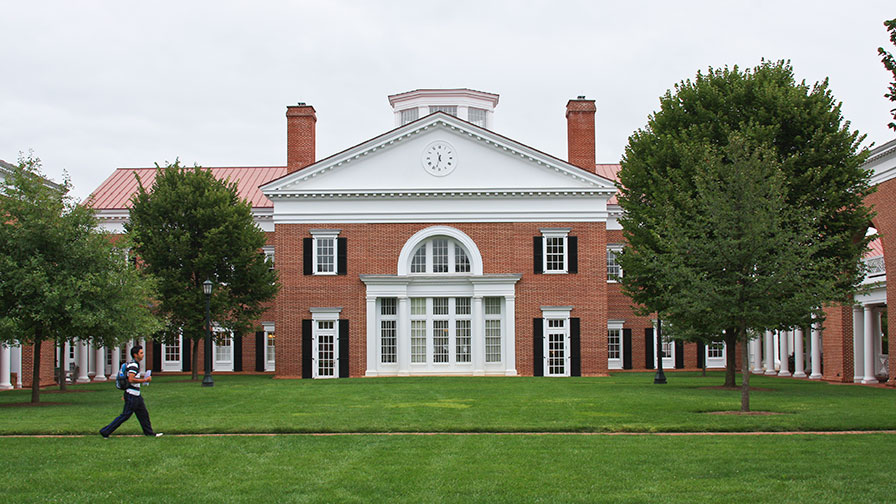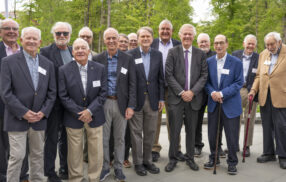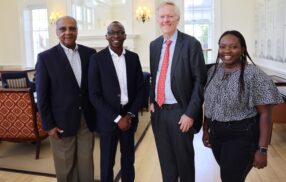
Can Entrepreneurship Create Jobs for the Middle Class?
This is an age of anxiety for many Americans. In a 2013 poll conducted by U.Va.’s Miller Center and the Washington Post, a majority of respondents said they were concerned about paying for basic needs and hanging on to their jobs. Their worries reflect a troubling trend: For the past 30 years, as new technologies have transformed the U.S. manufacturing sector and a global labor market has shifted work overseas, job and wage growth for middle-skill occupations has been much weaker than it has been for high- and low-skill occupations — a pattern that was evident during the recent recession and has persisted in the current recovery.
Can entrepreneurship be part of the solution? On 12 and 13 May, a nonpartisan commission of 12 distinguished policymakers, business leaders, scholars, and other stakeholders gathered in Washington, DC, to address that question. The event, organized by the Miller Center and the Batten Institute, was part of the Miller Center’s Milstein Symposium, a multi-year initiative devoted to advancing innovative yet practical ideas for rebuilding the American Dream. The symposium, titled “Ideas for a New American Century,” is funded by business leader and philanthropist Howard Milstein. The focus for 2013-2014 is job creation.
“Policymakers regularly speak of the promise of entrepreneurial activity for the middle class, but it’s not clear if start-ups are the jobs engine that many want them to be,” said Sean Carr, the executive director of the Batten Institute. Research has shown that from 1977 to 2005, young companies created around 3 million net new jobs annually, while all other firms accounted for the loss of 1 million jobs. But more-recent data paint a disturbing picture. For example, the National Bureau of Economic Research found that job creation from start-ups was lower in 2009 than at any time since 1980. And the Kauffman Foundation predicted that firms established in 2009 would generate 1 million fewer jobs, compared with historical averages, during their first five to ten years.
Even if start-ups are creating jobs, what kinds of employees fill them? “If new businesses are mainly hiring engineers, then they might not be helping the middle class,” Carr noted. “If our goal is to generate middle-wage jobs, we need to think about what kind of ventures can do that.” He and Batten Institute academic director Michael Lenox served as the lead scholars for the commission, offering an overview of research on the topic to help frame the discussion.
In its two days of closed meetings, the commission discussed what type of entrepreneurial activity can best generate stable employment for the middle class, how to reduce the barriers to entry for entrepreneurs, how best to educate individuals for employment in or founding new ventures, and what public and private policy levers can increase entrepreneurship among the middle class. Four areas of particular focus were financial capital, human capital, regulation, and ecosystems.
The commission is chaired by Steve Case, the founder and former CEO of AOL and the chairman of the Startup America Partnership, and Carly Fiorina, the former chairman and CEO of Hewlett-Packard and an advocate for education and entrepreneurship. In the coming months, the group will develop the ideas that emerged during the symposium into policy proposals. The group’s findings and recommendations will be released in the fall.
“Our goal for the commission is to come up with ideas that have a viable path to implementation,” said Jeff Chidester, the director of policy programs at the Miller Center. “We’re not interested in a lofty grand-bargain-type of plan. We’re realistic about the political climate right now, so we’re encouraging the group to generate attainable ideas, things that can actually become policy.”
“As entrepreneurs often say, ‘Let’s do the doable,'” Carr noted. “Let’s focus on what is achievable.”
The model for this event and others in the Milstein Symposium series was inspired by the Jefferson Innovation Summit, organized by the Batten Institute in 2011 and 2012 to explore how best to encourage an entrepreneurial ecosystem in the nation at large and in Virginia. The two summits convened a diverse group of policymakers, academics, government officials, business leaders, and representatives from the arts and media for two days of guided discussion and brainstorming. Participants worked over the subsequent months to shape the output into practical ideas, several of which were embraced by the Office of the Governor of Virginia and presented to the Virginia legislature.
“As we were looking for a model for the Milstein Symposium, we saw in the Jefferson Innovation Summit a forward-looking approach,” Chidester said. “We were impressed by the quality of the conversation and the ability to get such a diverse group of participants to find a way forward on complex issues. Actionability is baked into the process.”
Chidester and his colleagues used this model for the first Milstein Symposium, held in September 2013. The commission for that event-chaired by Haley Barbour, a former governor of Mississippi, and Evan Bayh, a former U.S. Senator and former governor of Indiana-considered the challenge of spurring job creation in a manufacturing environment that has been reshaped by technology and shifting global demand. That commission will release its report on 13 June at the National Press Club, in Washington, DC.
The third and final commission for 2013-2014 will explore how to develop the national infrastructure necessary to complete in the global economy. Over the next several years, the Milstein Symposium will address the topics of workforce development, education, retirement, and the changing demographics of the middle class in the United States.
Milstein Symposium: Entrepreneurship and the Middle Class provides a research overview of the topic and a list of the commissioners for this symposium.
The University of Virginia Darden School of Business prepares responsible global leaders through unparalleled transformational learning experiences. Darden’s graduate degree programs (MBA, MSBA and Ph.D.) and Executive Education & Lifelong Learning programs offered by the Darden School Foundation set the stage for a lifetime of career advancement and impact. Darden’s top-ranked faculty, renowned for teaching excellence, inspires and shapes modern business leadership worldwide through research, thought leadership and business publishing. Darden has Grounds in Charlottesville, Virginia, and the Washington, D.C., area and a global community that includes 18,000 alumni in 90 countries. Darden was established in 1955 at the University of Virginia, a top public university founded by Thomas Jefferson in 1819 in Charlottesville, Virginia.
Press Contact
Molly Mitchell
Associate Director of Content Marketing and Social Media
Darden School of Business
University of Virginia
MitchellM@darden.virginia.edu





